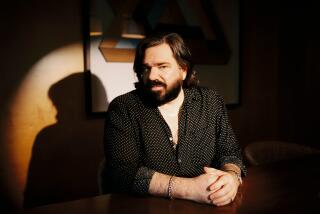Thomas Berry dies at 94; cultural historian became a leading thinker on religion and the environment
- Share via
Thomas Berry, a cultural historian and specialist in Asian religions who in his later life became a leading thinker on religion and the environment, has died. He was 94.
Berry died June 1 at the Well-Spring Retirement Community in Greensboro, N.C., according to an announcement on his website. The cause of death was not reported, but Berry was known to have been in failing health in recent years after suffering two strokes.
Described by Newsweek magazine in the late 1980s as “the most provocative figure among the new breed of eco-theologians,” Berry was an early advocate of the notion that Earth’s ecological crisis was basically a crisis of the spirit.
“Thomas Berry contributed to the realization in our times that environmental issues are more than science or policy. They are also issues of the spirit,” said Mary Evelyn Tucker, who with her husband, John Grim, heads the Yale Forum on Religion and Ecology and directs the Thomas Berry Foundation. “How well we respond to the planetary challenges that face us now will be determined by our ability to form an Earth community with a common future for all species.”
Calling the universe God’s “primary revelation,” Berry wrote in his book “The Dream of the Earth” that “the natural world is the larger sacred community to which we all belong.” In his view, Earth’s natural elements -- trees, forests, mountains -- had as much right to exist as humans. “We bear the universe in our being even as the universe bears us in its being.”
The third in a family of 13 children, William Nathan Berry was born in Greensboro on Nov. 9, 1914. He would later write in his book “The Great Work” that his sense of the natural world came to him at 11 when he discovered a nearby meadow. “The field was covered with white lilies rising above the thick grass. A magic moment, this experience gave to my life something, I know not what, that seems to explain my life at a more profound level than almost any other experience I can remember. It was not only the lilies. It was the singing of the crickets and the woodlands in the distances and the clouds in a clear sky.”
This highly personal experience helped inform his moral view. “Whatever preserves and enhances this meadow in the natural cycles of its transformations is good, what is opposed to this meadow or negates it is not good,” he wrote in “The Great Work,” adding what “is good in economics fosters the natural processes of this meadow. So in jurisprudence, law and political affairs -- that is good which recognizes the rights of this meadow and the creek and the woodlands to exist and flourish in the ever renewing seasonal expression.”
He said that his thinking was also shaped when he learned the names of trees during a Boy Scout trip. “That was a great event in my life,” he told the Greensboro News & Record earlier this year. “I learned what names mean and what the capacity to name something means. It’s the human dimension of life that establishes a world of experience.”
At 20, Berry entered the Roman Catholic Passionist order and took the name Thomas, after Thomas Aquinas.
“I recognized that I couldn’t survive in the world the way it was becoming,” he told the National Catholic Reporter in 2001. “I joined the monastery to escape from a world that was becoming crassly commercial, so that I could find meaning.”
Ordained a priest in 1942, he earned a doctoral degree in European intellectual history from the Catholic University of America. Along the way, he learned Sanskrit and Chinese to help his studies of Asian religions. He went to China to study Chinese religions, but the Communist victory in 1949 prompted him to flee. In the early 1950s, he served as an Army chaplain in Europe.
After returning to America, he taught the history of world religions at Seton Hall University, St. John’s University and Fordham University before retiring in 1979. He was also a founder of the Riverdale Center for Religious Research in Riverdale, N.Y. He was the director until 1995, when the center closed and he moved back to North Carolina. His two books on Asian religions are “Buddhism” and “The Religions of India.”
By the late 1980s, Berry had refined his focus and was writing on the intersection of ecological, spiritual and cultural issues. He called himself a “geologian,” or scholar of the earth.
His key works were “The Dream of the Earth” (1988), “The Universe Story” (written with physicist Brian Swimme; 1992), “The Great Work: Our Way Into the Future” (1999) and “Evening Thoughts: Reflection on the Earth as Sacred Community” (2006). Two more books of his essays, “The Sacred Universe” and “The Christian Future and the Fate of the Earth,” are scheduled to be published in August. Some of his reflections are on video at www.youtube.com/watch?v =pWdo2vpr-Rs.
“The planet Earth is something more than a natural resource to be used by humans,” Berry wrote. “Here we might propose that a viable future for the human community rests largely upon a new relationship between human communities and the planet we dwell on. Both our physical and spiritual survival depend on the visible world about us.”
He is survived by a sister and three brothers.
A public memorial service is being planned for September at the Cathedral of St. John the Divine in New York City. His family suggests that contributions be made to the Thomas Berry Foundation, c/o Mary Evelyn Tucker and John Grim, 29 Spoke Drive, Woodbridge, CT 06525.
More to Read
Start your day right
Sign up for Essential California for the L.A. Times biggest news, features and recommendations in your inbox six days a week.
You may occasionally receive promotional content from the Los Angeles Times.






